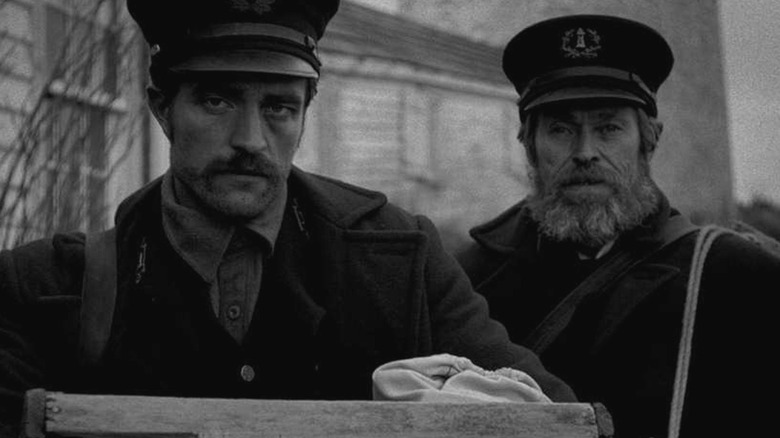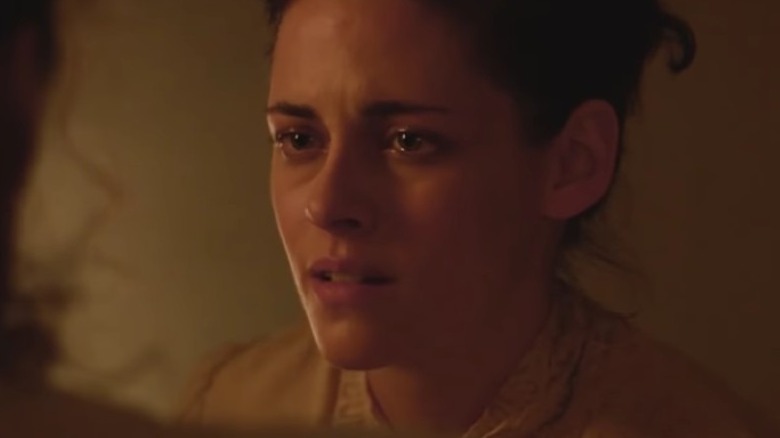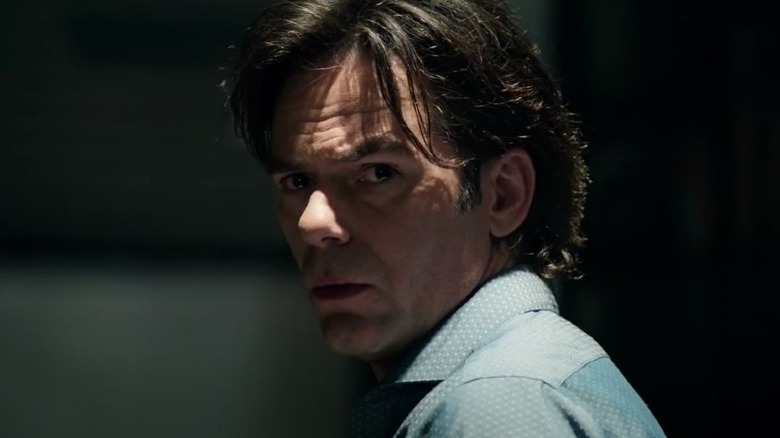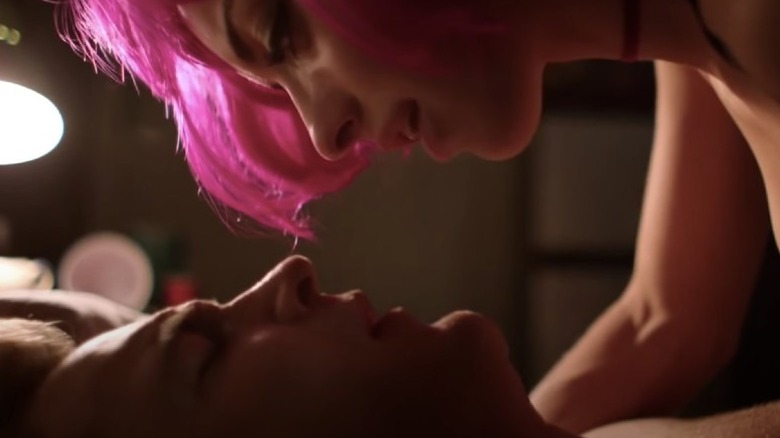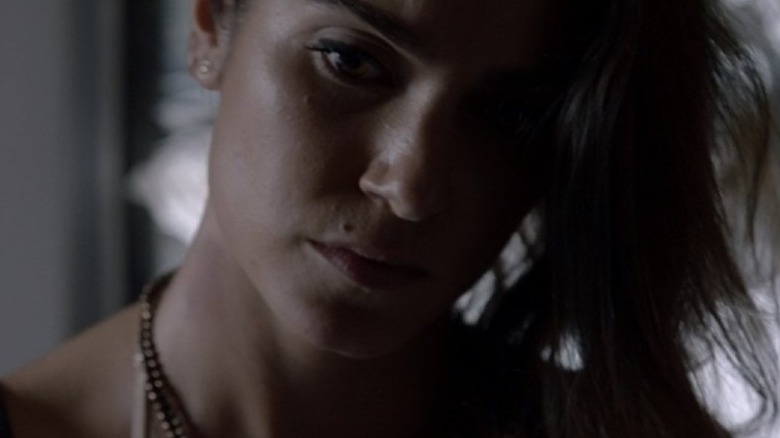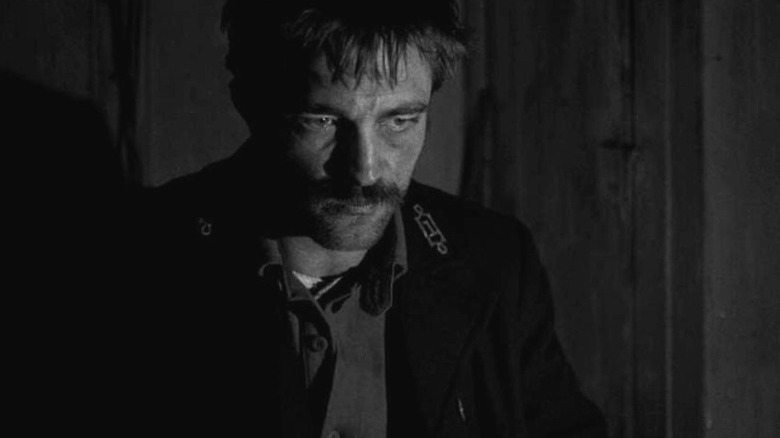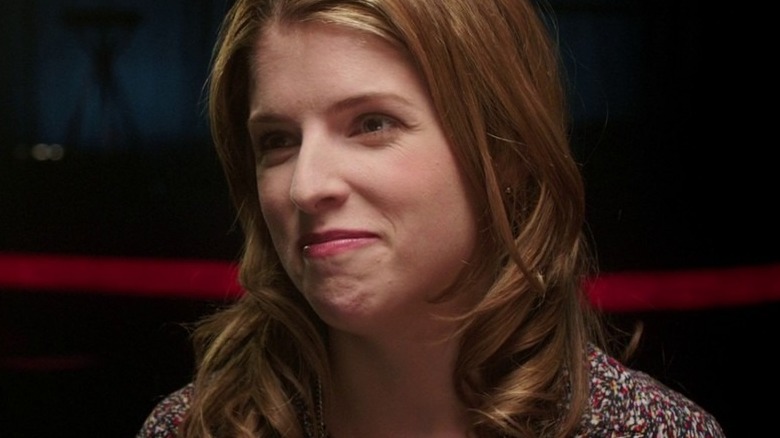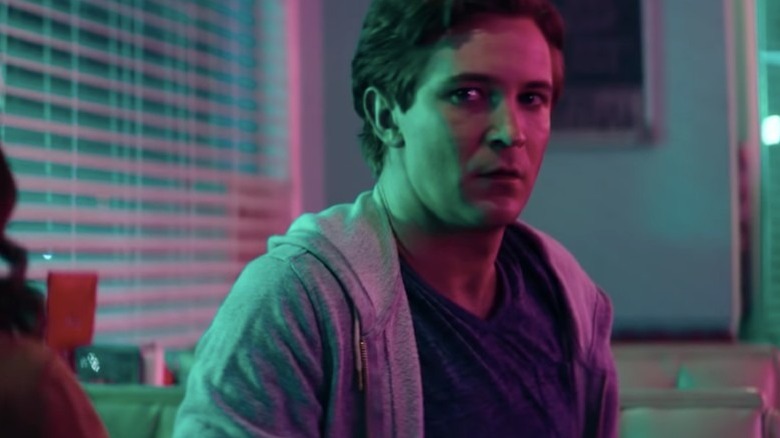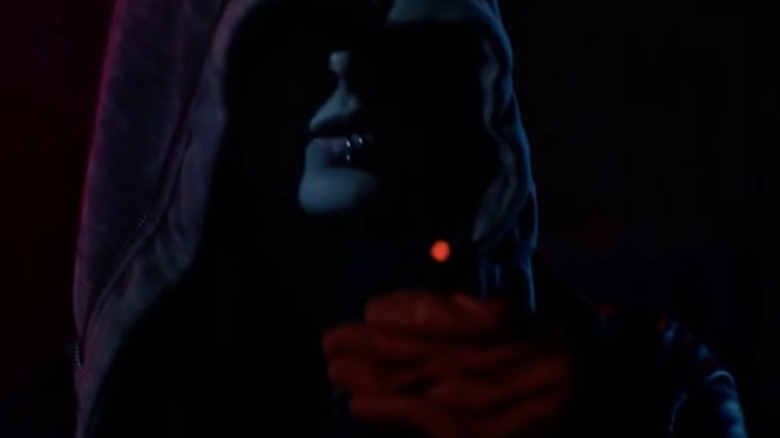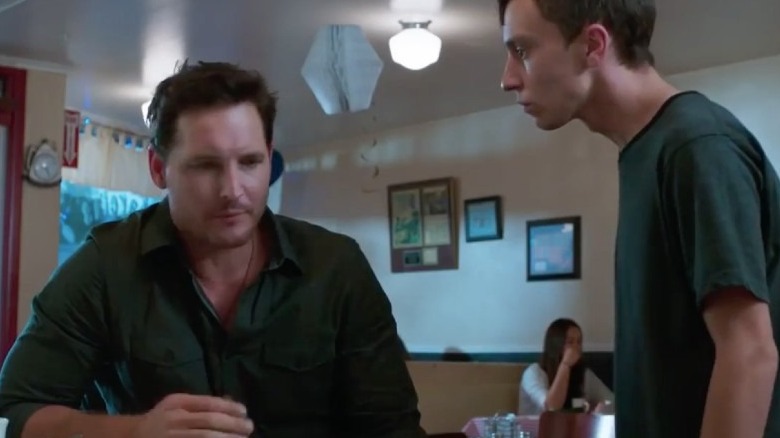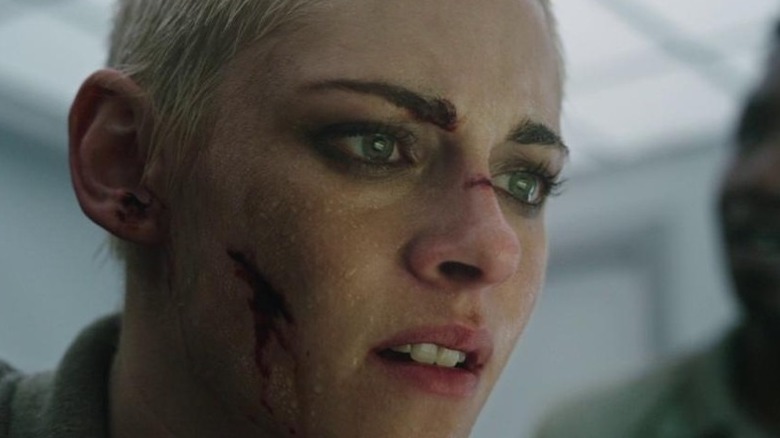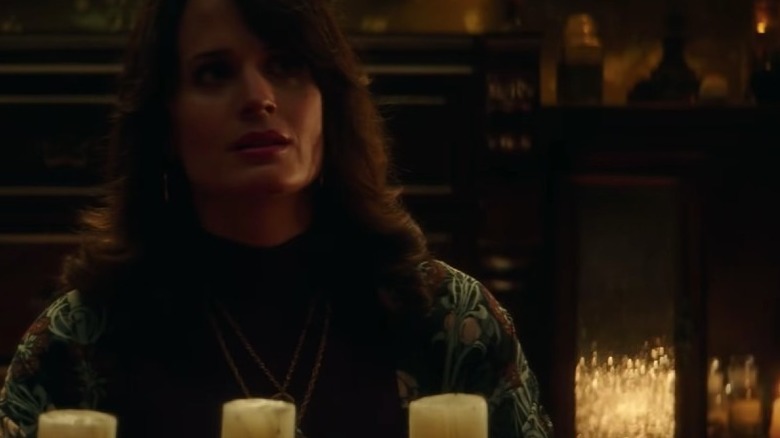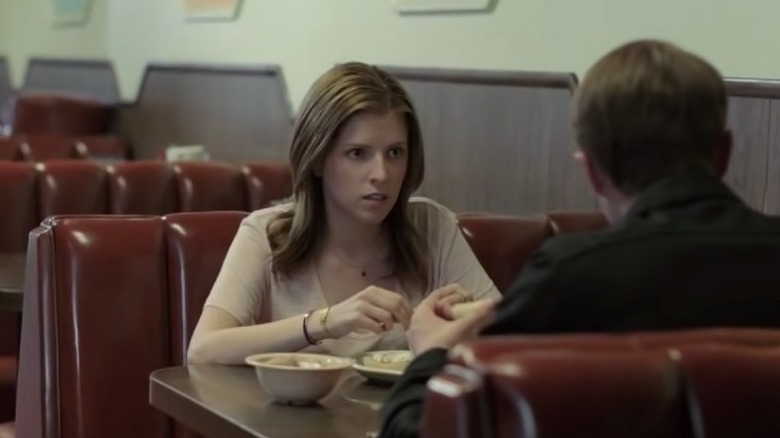The Cast Of Twilight Went On To Make Some Great Horror Movies
It's long-overdue to properly reassess the "Twilight" series as the vampiric masterpiece it is. Furthermore, it is due time to give the actors credit for their work and accept that everyone involved were actually good at their jobs. It's been an astounding decade since the saga's final entry, 2012's "The Twilight Saga: Breaking Dawn Part 2," and since then, many performers have gone on to shatter expectations and carve our impressive careers.
Robert Pattinson and Kristen Stewart have diversified their portfolios with magnetic star turns in "The Batman" and "Spencer," respectively. And that's only scraping the surface. Elsewhere, several other notable "Twilight" stars, including Elizabeth Reaser, Anna Kendrick, Michael Welch, and Billy Burke, have amassed some remarkable film credits, many of which land within the horror genre.
Taking inventory of the last decade, we flipped through the numerous horror films "Twilight" actors have delivered, ranging from okay to truly outstanding. The genres present are as wide-sweeping, including everything from psychological thriller and black comedy to "elevated" horror. Here's the rundown of the 12 best horror movies starring "Twilight" alumni.
Lizzie
The public dragged Kristen Stewart over the coals for her performances in the "Twilight" series, and like Robert Pattinson, she proved naysayers wrong in the years since. "Lizzie," directed by Craig William Macneill, reimagines the legendary Lizzie Andrew Borden story and explores the very real possibility that one of the most infamous American killers was a lesbian.
The film unravels the story in usual fashion. Lizzie (Chloë Sevigny) finds herself at odds with her family and struggles with expectations and societal pressures. The film takes great care to invite the viewer into her world, developing relationships and queuing up the dominos so when they fall they tumble with force. The arrival of a new housemaid named Bridget (Stewart) leads Lizzie to question her sexuality and cause even more friction within the household.
The film is a slow-burn in its purest form, yet Stewart's dynamic with Sevigny is nothing short of explosive. The small, intimate moments are as crucial to this new vision as the gruesome murders. It's like watching "Titanic" 一 you know what's coming, and the excitement lies in how the story unfolds.
Lights Out
Billy Burke has a relatively small role in David F. Sandberg's "Lights Out," but his part is the impetus for the whole story that soon follows. Playing a man named Paul, he worries about his mentally ill wife Sophie (Maria Bello) and his son Martin (Gabriel Bateman). Working late one evening at a textile factory, Paul encounters a dark entity who is only present when the lights go out, and it has the ability to swim around pools of light and control electricity. Nowhere is safe, as soon the entire factory's lights go out, and Paul is brutally slain.
"Lights Out" then follows Sophie, Martin, and her daughter Rebecca (Teresa Palmer), who harbors great resentment for her mother. A broken family is cast into the path of an unknown malevolent force that begins invading their everyday lives. Thematically and stylistically, the 2016 film carries a similar tone and story to "The Babadook," particularly in its dissection of grief and mental health.
Eventually, the story reaches a point where there's nowhere else to go but further down into darkness. Even though Paul isn't seen on screen, his presence lingers until the very end. Following days of being tortured by an evil spirit, Sophie is pushed to her brink and must make a profound decision. The finale is one of the most tragic in all of horror history.
M.F.A.
A rape-revenge film is a sub-genre of horror that doesn't work for everyone. In Natalia Leite's 2017 feature "M.F.A.," a promising art student named Noelle (Francesca Eastwood) is sexually assaulted by a classmate and careens out of control. She eventually takes matters into her own hands when it becomes clear no one else will actually do anything. Noelle is not only seeking justice for herself but other sexual assault survivors and bases her entire art thesis around reclaiming power from the patriarchy.
Michael Welch plays Mason, a frat member who assaulted another student from a nearby college. Welch's performance dives into the delusional and disregard often prevalent in campus rape culture. It's not a big, pivotal role to the overall film, but it proves important as a looking glass to reality and how so many in the world look the other way. Once Noelle sets her sights on him, his fate is all but sealed. Appropriate to the crime, her revenge is oh-so-sticky sweet.
If you or anyone you know has been a victim of sexual assault, help is available. Visit the Rape, Abuse & Incest National Network website or contact RAINN's National Helpline at 1-800-656-HOPE (4673).
Jack Goes Home
"Family is as family does," says Rory Culkin in a haunting intro monologue. Its heightened sense of poetry sets the tone for a film that crawls under the fingernails. Thomas Dekker's 2016 feature film "Jack Goes Home" follows Jack (Culkin) in the aftermath of a fatal car crash that kills his father.
The tragedy pulls him back to his hometown, and he is forced to confront long-buried family secrets. While dealing with past trauma and a tenuous relationship with his mother (Lin Shaye), he is three months away from becoming a father himself. Everything in his life, past and present, collides together, and the film is nothing short of one of the best in the last 10 years.
Nikki Reed appears only in a small role, playing a woman named Crystal, girlfriend to Shanda (Daveigh Chase), who is Rory's best friend. Shanda attempts to make sense of Rory's deteriorating state of mind and keep her own fledgling personal life intact. "Jack Goes Home" unapologetically slams into the inevitably of death and how, despite our best attempts, grief can swallow someone whole.
The Lighthouse
Robert Eggers' second feature film "The Lighthouse" is a cinematic marvel. Robert Pattinson stars alongside Willem Dafoe in a claustrophobic tale about loneliness and human desperation, and it is all set on the New England coastline. Both actors deliver career-defining performances, even though Pattinson has gone on record about how much it changed him forever.
The story is simple: Thomas Howard (Pattinson) takes a contract job at a lighthouse under the name Ephraim Winslow and serves under Thomas Wake (Defoe). When a relentless storm ravages the island's meager shores, they are unable to travel back to the mainland and undergo a grueling test of wills. Quickly, the unlikely pair fall down into an abyss of madness. Strange things begin to happen inside the beacon, and each player experiences a mental break in their own way.
For his role, Pattinson delivers nuanced punches, as well as a cyclone of emotion. Many moviegoers underestimated the power of his abilities, and "The Lighthouse" squelched all doubts. Ephraim Winslow will be remembered forever.
The Voices
There is not nearly enough talk about how perfectly "The Voices" walks the line between satire and serious commentary. Directed by Marjane Satrapi, the black comedy details a man named Jerry (Ryan Reynolds), who finds himself trapped in his everyday life and struggling to tread water with his mental health. His therapist urges him to take his medication, but he's worried the voices will go away.
The voices take form in his cat Mr. Whiskers and dog Bosco. They are his shoulder demon and angel, respectively, a physical manifestation of his mental illness. A new infatuation with co-worker Fiona (Gemma Arterton) reveals his obsessive behavior. When she stands him up on their first date, Jerry goes for a drive through the neighborhood and discovers her flagging him down when her car breaks down. The two decide to go get a bite to eat but end up crashing into a stray deer, who begs Jerry to kill him (in his mind, that is). The crash causes Jerry to spiral further out of control.
When Fiona goes missing, his gaze lands upon another co-worker named Lisa (Anna Kendrick). All things seem to be going well with this potential new romance, but it doesn't last for long. Jerry's inner turmoil is too much to bear and leads him down a dark, twisted path. "The Voices" handles mental health with an equal measure of sardonic humor and honesty.
The Final Wish
Timothy Woodward Jr.'s 2018 "The Final Wish" is far better than reviews would have you believe. Adapted from "The Monkey's Paw," originally a 1902 short story written by W. W. Jacobs, the psychological film journeys into the mind of Aaron (Michael Welch) as he comes to grips with the death of his father and tries to help his grief-stricken mother Kate (Lin Shaye).
Aaron has long-since left his dusty hometown behind for a shiny new life in the big city. Or that's the perception he puts forth. As an up-and-coming lawyer, he struggles to find a steady job at a law firm and works mostly as a contractor on various cases. In the meantime, he works at a coffee shop to make ends meet. When his father dies, he initially plans on heading home for only a couple days but quickly learns maybe it's time to reevaluate his priorities.
In his father's things, Aaron discovers a mysterious vessel, encrusted with gold and jewels. Unbeknownst to him, it grants wishes. As so often goes with these sorts of stories, Aaron doesn't pick up on the object's power until it's nearly too late to turn back. Throughout "The Final Wish," Aaron and Kate learn to confront and deal with their grief, and it comes with a heavy price tag, of course.
Kristy
Haley Bennett stars in Olly Blackburn's slasher flick "Kristy" as a young college student named Justine. During Thanksgiving break, Justine plans to stay on campus, and her low-key holiday plans are quickly interrupted when a group of cult killers crashes the party. Led by Violet (Ashley Greene), the bloodthirsty quartet hide behind masks and seemingly have no real motive.
The film wastes no time in getting to the good stuff. Within 35 minutes, Justine finds herself fighting for her life, and she proves more than capable. "Kristy" borrows elements from "The Strangers" and "You're Next" with some of the most tense, dread-filled chase scenes ever in a slasher movie. Long, drawn out sequences underscore the sheer high stakes at play. The campus itself serves as a crucial character as a way to further heighten the desperation.
Greene plays the cool villain with a certain command. Her cold, unfeeling nature contrasts Bennett's intense, emotionally-charged performance. "Kristy" has been overlooked for far too long.
Heartthrob
Chris Silverston's 2017 film "Heartthrob" digs deep into tragic young love. Sam (Aubrey Peebles) and Henry (Keir Gilchrist) have just graduated high school but never previously spoken. A fatal car crash of a classmate brings them together, both grieving in their own ways. Out of poisoned emotional roots, a romance swiftly blossoms.
Henry eyes an Ivy League education and a biomedical engineering career, while Sam plans on attending a local community college. They are complimenting extremes in every conceivable way. As their love grows, so does Henry's obsessive nature. He stalks her without her knowing and even taps her phone, listening in on conversations and whenever she's alone.
A string of local murders are seemingly unconnected to Henry, but things quickly become knotted in his relationship with Sam. He could very well be responsible, or maybe he's an easy scapegoat. Henry is nothing if not an oddball. Professor Rickett (Peter Facinelli) also vies for Sam's attention, grooming her into a morally questionable friendship (and later a physical/romantic one). "Heartthrob" manages to braid together complicated issues of burgeoning adulthood, fleeting youth, and pressures to map out one's entire life with plenty of bite.
Underwater
William Eubank's "Underwater" was one of the biggest surprises of 2020. An oceanic epic, the film follows a group of researchers who mount a risky expedition into the Mariana Trench. Kristen Stewart leads as Norah, alongside a cast which includes Mamoudou Athie (as Rodrigo), Vincent Cassel (Captain Lucien), and Jessica Henwick (Emily).
Within the first five minutes, the film goes for the jugular when an earthquake rips through the underwater channel and causes the operation's primary vessel to collapse. Norah first helps Rodrigo to safety and slowly discovers several other injured comrades. In order to escape, the team must venture to Roebuck Station one mile along the ocean floor. During their journey, team members are picked off one by one by an unidentified new species, possessing largely tentacles and sharp-toothed talons.
"Underwater" embraces aquatic horror conventions and also manages to keep the viewer on the edge of their seat. It's surprisingly captivating with a big ole heart, throbbing at its center.
Ouija: Origin of Evil
Sequels and prequels rarely overshadow a first film in a series. But you can mark Mike Flanagan's 2016 film "Ouija: Origin of Evil" as one of those prequels that is far superior to the 2014 original. Elizabeth Reaser plays Alice Zander, a scam artist posing as a real spiritual medium. Along with her two daughters Lina (Annalise Basso) and Doris (Lulu Wilson), Alice believes she is helping people move on from the dead.
When she purchases a ouija board from a local shop, Alice unwittingly summons a demon, and it swiftly possesses Doris. Set in the '60s, the film explores religious themes, as well as rebellion and grief. The family previously lost their father figure, and the demon leads them to believe they are communicating directly with their dead relative. They learn soon enough that not only does the entity have the most sinister intentions but discover long-buried secrets under the floorboards.
"Ouija: Origins of Evil" is not your traditional demonic possession story. It thrills and chills and defies the usual cliches (and sometimes uses those same tools to terrorizing you in refreshing ways). It's a delightful entry in the ghost story pantheon.
Life After Beth
With 2014's "Life After Beth," director Jeff Baena utilizes the standard zombie apocalypse to dig into a story surrounding death, denial, and acceptance. When Beth (Aubrey Plaza) dies, her boyfriend Zach (Dane DeHaan) is immobilized in grief. He turns to Beth's parents as a way to bond and support one another, but when they stop talking to him, he storms over to their house to ask why.
Through the window, he discovers Beth, very real and very much alive. Confused, he erupts into a tirade and is escorted off the property. Zach begins to firmly believe Beth is really alive and goes to her gravesite to discover someone has dug up her plot. From there, the film wades through the afterlife and how hard it can be to move on, even for the dead who don't know they're dead.
Zach's ex-girlfriend Erica (Anna Kendrick) brushes up against death, as well, when forced to kill her own grandmother. What makes "Life After Beth" a successful zombie film is its irreverent dark humor, laced perfectly with pointed, insightful conversations about hope and love.
